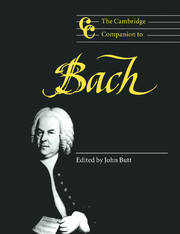Book contents
- Frontmatter
- Introduction
- Part I The historical context: society, beliefs and world-view
- 1 The Bach family
- 2 Bach and the domestic politics of Electoral Saxony
- 3 Music and Lutheranism
- 4 Bach's metaphysics of music
- 5 ‘A mind unconscious that it is calculating’? Bach and the rationalist philosophy of Wolff, Leibniz and Spinoza
- Part II Profiles of the music
- Part III Influence and reception
- Notes
- Select bibliography
- General Index
- Index of works
4 - Bach's metaphysics of music
from Part I - The historical context: society, beliefs and world-view
Published online by Cambridge University Press: 28 September 2011
- Frontmatter
- Introduction
- Part I The historical context: society, beliefs and world-view
- 1 The Bach family
- 2 Bach and the domestic politics of Electoral Saxony
- 3 Music and Lutheranism
- 4 Bach's metaphysics of music
- 5 ‘A mind unconscious that it is calculating’? Bach and the rationalist philosophy of Wolff, Leibniz and Spinoza
- Part II Profiles of the music
- Part III Influence and reception
- Notes
- Select bibliography
- General Index
- Index of works
Summary
NB. Where there is devotional music, God with his grace is always present
(J. S. Bachy annotation to Calov's Bible commentaryPious men of strict observance can hardly see in art an obedient maidservant... rivalry begins, first, in rivalry between the religious spirit and the aesthetically… oriented man … Religion is always imperialistic … but science, art, and ethics are also imperialistic … and yet, the paths of religion, art, ethics, and science not only cross, they also join.
(Gerardus van der Leeuw)Studies of theology, religious symbolism, allegory and rhetoric tell us much about the historical context and function of Bach's music, but alone they do not adequately reveal how Bach conceived of his music. In other words, the purely theological viewpoint often illuminates the message of Bach's music without giving any explanation of his conception of the medium. It is the very basis of my approach here to contend that there may indeed be contradictions between the historical religious context and, specifically, the metaphysical basis of his creative work. Throughout, I negotiate a delicate and speculative tightrope: on the one hand in conjecturing about Bach's own view of the task of composition (and performance) from a sparse array of verbal documents, and on the other in surmising what his music and certain tendencies in his compositional output may tell us.
While I offer a general study of some of the conceptions of music and its relation to religion in Bach's age, I give particular attention to one particular hypothesis: that Bach saw the very substance of music as constituting a religious reality, that the more perfectly the task of composition (and, indeed, performance) is realised, the more God is immanent in music. Traditionally, something of this conception has been inferred from the intertwining of the sacred and secular in Orthodox Lutheran thought, and indeed in Luther's own attitude towards music as a vital aspect of the Christian life (see Chapter 3). Furthermore, the Pythagorean tradition of viewing music as the sounding evidence of God's creation was still evident in the writings of music theorists who embraced natural theology.
- Type
- Chapter
- Information
- The Cambridge Companion to Bach , pp. 46 - 59Publisher: Cambridge University PressPrint publication year: 1997
- 16
- Cited by



